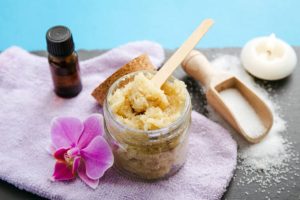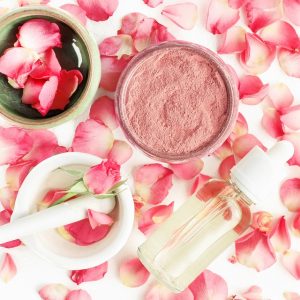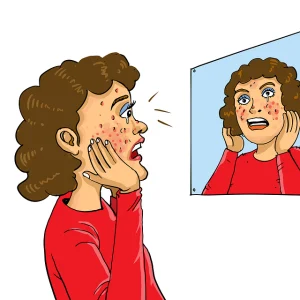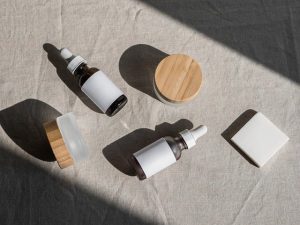One thing commendable about consumers of today’s world is that they want to be well-aware and informed regarding each and every product they use. To attain the knowledge they desire, the internet is something they look to, but over-flooded advice on the internet can make them feel lost in the blink of a beat. Undoubtedly, we heavily rely on the information available online to clarify our doubts, but at times, we unknowingly become victims of some false information or myths that drift us away from our purpose.
Today, we’ll walk you through various skincare myths and give you logical explanations behind each one of them:
• Scrubbing hard to get rid of whiteheads and blackheads:

No pain no gain formula isn’t applicable in this scenario.
You have to be extremely gentle with your skin while sloughing away the dead skin cells, dirt, and clogged pores, or else the protective layers of your skin will get damaged. If you’re not conscious, it may leave cuts behind and, not to mention, lead to inflammation, giving way for microorganisms to enter your skin and cause infections. This might further lead to scars and discoloration.
To prevent any of this from happening, exfoliate your skin gently twice to thrice a week.
• Plant-based products aren’t effective:

There is a common misconception about plant-based products not being as beneficial and effective as products with a chemical composition. Chemical-based products are thought to have faster results, whereas this is so not the case.
Products made with chemicals are rich in harmful substances like parabens and sulfates, which, instead of treating, damage the skin even more and can cause irritation or trigger allergies.
However, with the usage of plant-based products, they cure and cleanse the skin deeply. The power of natural ingredients present in them has proven to be efficient and deliver maximum results. As a bonus, these products are free from any sort of nasties and work so well that they help you achieve that desired glowing and radiant skin which will go a long way.
• Acne and pimples are only teenager problems:

Without a doubt, teenagers are most prone to acne and pimples due to the hormonal changes their bodies go through during puberty. However, that is just another phase of life that doesn’t explain why a person in their 30s or older is facing these problems.
Acne and pimples do not discriminate when it comes to age; they can happen to anyone of any age and gender. There are various factors which can contribute to their being triggered, and, like an unwelcome guest, they can come at any time. These include pregnancy, menopause, unhealthy diet, pollution, poor lifestyle, etc.
A few steps which can go a long way towards keeping acne and pimples at bay include: washing your face twice a day, following a proper skincare routine every day, and eating well to achieve nourished and clearer skin.
• Oily skin doesn’t require moisturizer:

Do not believe what anyone says about moisturizers; every skin type requires moisturizers, especially if you have oily skin, as it’ll help your skin balance out oil production. Make sure to use an oil-free moisturizer to prevent greasiness or stickiness.
Moreover, a cleanser can strip away the natural oils produced by your skin and make your skin a little dehydrated. To protect it, you’ll need a protective layer to compensate for the loss.
• Drinking excess water keeps your skin hydrated:

Without a doubt, drinking water is the best way to hydrate your body, but that doesn’t mean it will work the same for your skin individually. Many claim that drinking water is good for the health of your skin; however, there is no such evidence to support this claim.
The water you drink is passed through your digestive tract, further into the bloodstream, and finally to the kidneys, which filter it and help hydrate your body overall.
In order to keep your skin hydrated, it’s best to apply serums and moisturizers as they retain the moisture within the skin and act as a barrier.
• Retinol isn’t essential until age 50:

Due to its popular anti-aging properties, retinol is often misunderstood to be something to be used only by those who have started showing signs of aging. On the contrary, retinol is something that is highly recommended in order to delay the signs of aging.
The appropriate age to introduce retinol into your skincare routine is in your mid- to late-20s. It is a treasure for your skin; the nourishment it provides your skin is astounding, as it increases collagen production, unclog s pores, treats acne, evens out skin tone, and delays or minimizes fine lines and wrinkles.
For starters, slowly introduce retinol into your skincare routine by using it once or twice a week.
• Usage of sunscreen isn’t important in fall or winter:

The season may change, but the sun doesn’t. Although the sunburn-causing ultraviolet rays may not be as strong in winter, that doesn’t mean they aren’t there. To simply put, even when you can’t see the sun and think you don’t require applying sunscreen on yourself, guess what? The UV rays are always present in daylight, even on cloudy days.
The UV rays are the core reason for skin cancer. Neglecting to protect your skin also comes with complementary problems like aging and hyperpigmentation.
You can afford to skip anything, but not sunscreen—your shield against the sun.
• The more expensive the product, the better it is:
This is one such myth which promotes many skincare brands to charge you five times the actual cost, just for the sake of “the expensive, the better.” Spending extra money on your products does not guarantee anything. You have to be conscious of formulations and ingredients, and even mid-range products are capable of serving your skin way better than those overly priced products.
Bottomline:
Not everything the internet says is true. Be extremely aware of what works best for you, as no one knows your skin better than you or your dermatologist. Fact-checking is something you can’t miss out on when it comes to your skin because your skin is the most sensitive and reactive part of your body, requiring constant care, nurturing, and nourishment for it to glow and look refreshing.


